
19 minute read
Paving Section
SECTIONPaving Pages 41-57

For more information on paving, compaction and milling equipment, as well as comparison charts, visit CEG's Web site at www.constructionequipmentguide.com.
Case Construction Equipment introduced the SV215E and SV217E single-drum vibratory rollers — two new models built for fast and consistent soil compaction on varying lift depths and material types. This is achieved with high centrifugal forces and standard dual amplitude and dual frequency capabilities that allow the operator to dial in compaction performance to each lift.
Both rollers operate at 154 hp and weigh in at 33,420 and 36,500 lbs., respectively, with centrifugal forces up to 73,063 and 74,861 lbs. Each model also is compatible with ACEforce intelligent compaction technology to further ensure compaction quality, documentation and productivity.
This introduction brings the Case single-drum soil compaction lineup to five models ranging from 75 to 154 hp.
“Our focus is on providing the North American market with a full-line of soil compaction equipment that fits a variety of jobsite profiles and transportation needs,” said Jeremy Dulak, product manager, Case Construction Equipment. “These new models add compaction power and performance at the higher end of the product line while retaining the versatility and compaction performance of Case rollers — and we’re helping contractors complete compaction in fewer passes, even on deeper lifts.”
Case E Series compactors feature a lowcenter-of-gravity, as well as an axle-free design that provides constant power to the wheels and drum with an electronic selfadjusting torque control system. This is further assisted by automatic traction control with HX drive propulsion system — optional on smooth drums and standard on padfoot models. This creates enhanced stability and performance on grades up to 67 percent, according to the manufacturer.
Compaction performance is further enhanced with an oscillating articulated roller joint that maintains consistent drumto-ground contact, and an updated drum design that reduces drift and maintains constant compaction throughout each rotation. Standard dual frequencies and amplitudes, along with standard auto vibration control, let the operator set compaction performance based on the type of material and the depth of lift — reaching desired compaction in fewer passes and ultimately improving productivity and reducing wear and tear on the equipment.
Available in both cab and open ROPS configurations, Case E Series soil compactors feature a spacious, comfortable and intuitive operator environment with an adjustable seat that swivels up to 80 degrees, providing added visibility to the drum surface and flexibility for compaction in both forward and reverse. The axle-free design also allows the engine to sit lower in the machine, which further improves visibility to the rear with a low, sloped rear hood.
All primary machine information and controls are found in an LED display integrated within the steering wheel of the machine. The display features three core interfaces dedicated to operation and performance, machine information and onboard diagnostics. The display, locked within the steering wheel, eliminates the need for other displays and a larger, bulkier dashboard — further improving visibility from the operator station down to the work area and centralizing all core machine information in a single location.
Both new machines are designed for easy groundline serviceability with a manual-lift hood that provides easy access at ground level to all fluid ports, drains, service checkpoints and filters — as well as a cab that can be easily tilted forward for access to all primary hydraulic components of the machine.
Each model also is available with optional Case SiteWatch telematics to further enhance fleet management activities.
Additional options include a leveling blade, a padfoot shell kit for smooth drum models; a pressurized cab with heat, ventilation, air conditioning and radio; traction tread tires, a rotating beacon, a backup camera, and extra front work lights (only available on smooth drum models).

Case E Series compactors feature a low-center-of-gravity, as well as an axle-free design that provides constant power to the wheels and drum with an electronic self-adjusting torque control system.
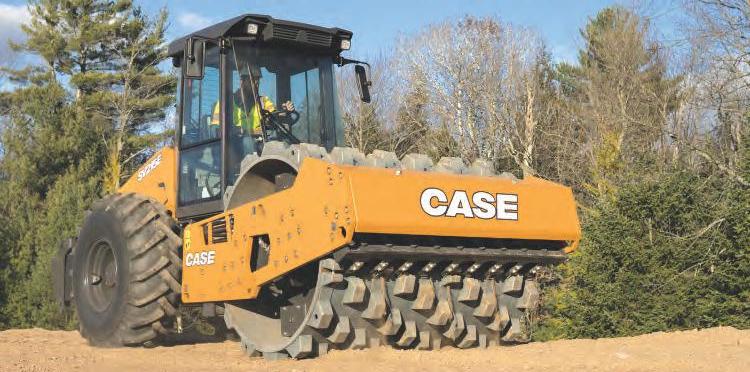
Compaction performance is further enhanced with an oscillating articulated roller joint that maintains consistent drum-to-ground contact, and an updated drum design that reduces drift and maintains constant compaction throughout each rotation.
Page 46 • December 22, 2021 • www.constructionequipmentguide.com •Paving Section • Construction Equipment Guide NAPA Modernizes Leadership Structure, Welcomes Incoming National Officers
Following the overwhelming approval of voting members in the fall, the National Asphalt Pavement Association’s executive committee formally approved revised governing bylaws at its November meeting. The updated bylaws take effect Jan. 1, 2022, establishing a roadmap for engagement at national and regional levels as the industry works to implement the Infrastructure Investment and Jobs Act (IIJA).
Primarily, the revised bylaws modernize the association’s leadership structure in two distinct ways to generate more input and impact. These include: 1. Streamlining NAPA’s board of directors, capping it at 30 members (down from a high of 80 at times), which sets national strategy for the industry and performs oversight and fiduciary duties for the association, and 2. Establishing an advisory council comprised of four geographic regions — Northeast, Southeast, North Central and West — that will feed emerging and important issues to the national body, while supporting national efforts at the regional and local level.
Effectively, these actions empower members and leaders through engagement opportunities and representation, generate greater focus through understanding of key initiatives and industry priorities, encourage grassroots execution through regional leadership, create alignment with State Asphalt Pavement Association (SAPA) partners and reveal a transparent pathway to association leadership, the association said.
“The new board is going to be able to move in a more nimble way and have more succinct conversations about challenges in our industry,” said Jim Mitchell, who chaired the Governance Task Force that recommended the bylaw revisions.
“I’m really excited about the two-way conversation between the board and the four new regions, and their opportunity to influence and impact national issues on a regional level,” he added.
Separately, in its annual election, voting members approved the incoming 2022–2023 National Officers, who will begin their terms at NAPA’s Annual Meeting in Scottsdale, Ariz., in January. They are:
Chairman: James (Jim) Mitchell, who has served the association in a leadership capacity since 2017, most recently as first vice chairman. In NAPA’s 66-year history, he is the third son of a past chairman to become chairman as well. Mitchell is the president of Superior Paving Corp. in Gainesville, Va.
First Vice Chair: Christian Zimmermann, New England Group president, CRH Americas Materials, Belmont, N.H.
Second Vice Chair: Brady Meldrem, president, Norris Asphalt Paving Co., Ottumwa, Iowa.
Secretary: Patrick Nelson, president & CEO, LehmanRoberts Company, Memphis, Tenn.
Treasurer: Robert Doucet, president, Barrett Industries, a Colas Co., Morristown, N.J.
To support the incoming national officers, align with the revised bylaws and further advance its national strategy, the association enacted several staffing updates: • Ester C. Magorka is now senior vice president, Industry Promotion & Membership. • Amy Miller is now vice president, Member & Industry Alliances and national director, Asphalt Pavement Alliance. • Ashley N. Jackson is now senior director, Government Affairs & Political Action Committee. • Kelly Kanaras is now director, Industry Promotion. • Michelle Kirk is now manager, Alliances & Awards. • Ebony (Ealey) Curry is now administrative assistant & Diamond coordinator.
The association gathers in person Jan. 23 to 26, 2022, to install the new national officers, share educational and networking opportunities to advance the asphalt pavement industry and IIJA implementation, and hear from keynote speaker Nido Qubein, president of High Point University in North Carolina.
For more information, or to register, visit AsphaltPavement.org/Annual. LESLIE EQUIPMENT COMPANY
www.lec1.com
6248 Webster Road Cowen, WV 26206 304/226-3299 80 John Deere Lane Norton, WV 26285 304/636-6421
2098 Lillian Lane Pleasant Valley, WV 26554 304/534-5454
136 Clifftop Drive Beaver, WV 25813-1525 304/255-1525
19 Goff Crossing Drive Cross Lanes, WV 25313 304/204-1818
MONROE TRACTOR
www.monroetractor.com 1001 Lehigh Station Road
Henrietta, NY 14467 585/334-3867 5035 Genesee Street
Buffalo, NY 14225 716/681-7100 Toll Free: 800/834-9606 7300 Eastman Road
N. Syracuse, NY 13212 315/452-0000 Toll Free: 800/287-5286 8194 State Route 415 Campbell, NY 14821 607/739-8741 800/866-8912 6 Equipment Drive Binghamton, NY 13904 607/754-6570 866/321-4277
GROFF TRACTOR & EQUIPMENT, LLC.
www.grofftractor.com 800-33-GROFF 800-33-(47633)
6779 Carlisle Pike Mechanicsburg, PA 17050 20 Stauffer Lane Ephrata, PA 17522 210 Rolling Ridge Drive Bellefonte, PA 16823 100 Smith Drive Cranberry Twp, PA 16066 963 South Center Ave New Stanton, PA 15672 4355 Admiral Peary Highway Ebensburg, PA 15931
ROBERT H. FINKE & SONS INC.
GSSI Introduces New PaveScan RDM www.finkeequipment.com 1569 US Route 9W Selkirk, NY 12158 888/266-9821 2.0 Asphalt Density Assessment Tool UNITED CONSTRUCTION & FORESTRY 518/767-9331
GSSI, a leading manufacturer of ground penetrating radar (GPR) equipment, announced PaveScan RDM 2.0 — an asphalt density assessment tool that provides accurate real-time measurements to ensure pavement life and quality.
GSSI unveiled PaveScan RDM 2.0 for the United States and Canada at the Transportation Research Board 2020 Conference in January. PaveScan 2.0 incorporates a new sensor design built specifically for the extremes of the asphalt paving environment, foldable deployment arms with high-visibility for work site safety and has a warm-up time of under one minute when ambient temperature is over 70 F.
PaveScan RDM is ideal for uncovering problems that occur during the paving process, including poor uniformity and significant variations in density. By avoiding these problems, PaveScan RDM helps avoid such premature failures as road raveling, cracking and deterioration along joints, according to the manufacturer. This system automatically measures the dielectric value to identify anomalies in real-time. In addition, the dielectric values can be used to as a means to correlate percent voids and density in new pavement. The innovative technology enables users to obtain critical density data for QA/QC of new pavements. Unlike other options, like nuclear density gauges or radioactive alternatives, PaveScan does not result in any site hazards or require closing off work areas. Seamlessly integrating with GPS systems, PaveScan features a flexible, modular design that facilitates easy and efficient operation and data collection. It is offered as a single sensor or a three-sensor cart based configuration. As of April 2019, this pavement density measurement technology is an accepted American Association of State and Highway Transportation Officials (AASHTO) specification, PP 98-19. For more information, visit www.geophysical.com.
www.unitedcf.com 80 Southbridge Rd. • Route 20
North Oxford, MA 01537 508/987-8786 • 800/922-8295 2397 GAR Highway • Rte 6 & 136
North Swansea, MA 02777 508/379-9810 • 800/456-6885 88 Camelot Drive • Unit 42 Plymouth, MA 02360 508/830-9997 • 800/916-0997 1620 Page Blvd Springfield, MA 01104 413/543-5595 • 800/734-5594 4 Sterling Road North Billerica, MA 01862 978/667-4345 • 800/531-2266 98 Sheep Davis Road Pembroke, NH 03275 603/225-2769 300 Clinton Street Springfield, VT 05156 802/885-6840

866-430-7539
www.jfwequipment.com sales@jfwequipment.com
Serving the Asphalt Industry for 30 Years
2009 Etnyre Centennial II distributor, 2000 gallons, BT-1 computer, propane burners, 14 ft spray bar, 2009 Sterling L7500 w/Mercedes dsl eng, 6 spd trans, 2 spd axle $87,000
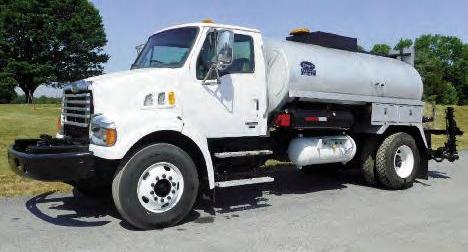

1998 Cat PS150B pneumatic 9 wheel roller, Caterpillar diesel engine, hydrostatic drive, water system - $31,000

New Marathon KERA10 oil jacketed walk behind crack sealer, 10 gallons, 80,000 BTU propane burner, heated 1" discharge valve, 3” spring loaded squeegee $6,500
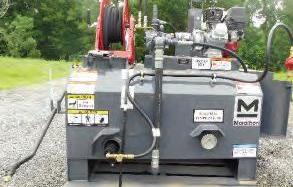
New Marathon TPS115S tack distributor, Honda gas eng, 10GPM pump, 115 gallons, 5 ft spray wand w/50ft hose, hose reel, 80,000 BTU propane burner, flushing system - $8795 2015 Laymor Sweepmaster SM400 broom, Kubota diesel engine, water system, 8 ft broom, cab w/heat & a/c, all new tires - $36,000
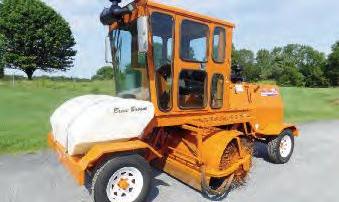


1989 Etnyre chip spreader, 12 ft spread hopper, Cummins 5.9L diesel engine, hydrostatic drive, 2WD $18,000

New Marathon TPS250T tack distributor, Honda gas eng, 18GPM pump, 250 gal, 5 ft spray wand w/50 ft hose, 6 ft spray bar, operator’s platform, propane burners, flushing system, electric brakes - $15,500
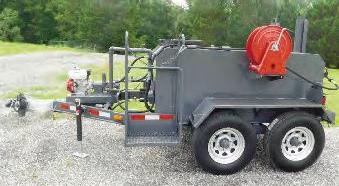
NAPA ‘Pave It Black’ Podcast Highlights Tech Innovations
By Tom Gresham
NAPA
New technologies are reshaping the asphalt pavement industry, and the pace of change is accelerating as high-tech tools grow both more sophisticated and accessible. During Season 3 of “Pave It Black,” NAPA’s podcast covering the people and issues affecting the industry, hosts Richard Willis and Brett Williams interviewed industry experts to dig deeper into the innovations that are most affecting the realm of asphalt pavement — and that promise to change the way the industry operates long into the future.
Episode 1: “What Is Innovation?”
In Episode 1, Nicholas Webb, founder and CEO of LeaderLogic and the keynote speaker at the 2020 NAPA Annual Meeting, detailed his thoughts on the concept of innovation and how it promises to impact the asphalt pavement industry.
Episode 2: “It’s Electric”
Dan Gallagher, president of Gallagher Asphalt, discussed the growing electrification of vehicles and how that affects the asphalt industry — an industry funded in part by gas taxes through the Highway Trust Fund.
Episode 3: “Innovation = Business Opportunities”
Katie Peabody, senior business analyst with Lakeside Industries, joined “Pave It Black” to discuss the far-reaching impact of new developments in computing technology. “Everything is definitely evolving,” she said. “As an organization, we realize the importance of these technologies in order to continue to thrive in the industry, even though it isn’t always easy to adopt and utilize technology.”
Episode 4: “Big Data in the Asphalt Industry”
Dan Ridolfi, president of California-based LASTRADA Partners, dove into how data analytics and artificial intelligence can help operators “focus on what matters.” Ridolfi explained, “What we have the ability to do today is expand the databases, and that’s kind of what’s exciting about our world.”
Brent Carron, president of Valley Paving in Minnesota, explained the benefits of thermal profiling, a tool not widely used in the industry, but one that offers an opportunity for contractors to ensure high-quality asphalt pavements.
Episode 6: “Going Paperless”
Dan Ganoe, vice president of operations for Lindy Paving in Pennsylvania, discussed the implementation of e-ticketing and how to move to a paperless world.
Episode 7: “Robots Help in the Work Zone”
During National Work Zone Awareness Week, Todd Hendricks, Jr., president of Ohio-based Pioneer Industrial Systems, shared that his company is pursuing two robotics solutions for road maintenance projects: sealing cracks on roads and setting and picking up cones in work zones.
Episode 8: “Efficient Fleet Management”
Mike Wills, area manager for Californiabased Granite Construction, said technology is allowing for much more efficient deployment of trucks to sites, such as through an app that Granite uses with drivers.
Episode 9: “The Dynamics of Asphalt Plant Management”
Ben Adomyetz, sales representative and estimator for the Rogers Group in Alabama, described how software can help asphalt operators plan, track, and communicate, such as during the transition from the bidding process for a project to the project itself.
Episode 10: “Doing More with Drones”
Carl Pittman, a civil engineer with Apac Mississippi, and Jessica Lewis, a graduate student at Mississippi State, provided their insight into the ways that drones have increased safety and efficiency at project and plant sites. “The real success in a drone program is going to come down to how you use that data,” Pittman said. “You can go collect all the data you want. If it sits in an Excel spreadsheet, and never goes anywhere, you’re not really doing much with it.” (Reprinted with permission from the National Asphalt Pavement Association)

Hosts Brett Williams (in foreground) and Richard Willis discuss technology issues on NAPA’s “Pave It Black” podcast.
The Concrete Industry Management (CIM) program — a business intensive program that awards students with a four-year Bachelor of Science degree in concrete industry management — announced that one of the signature items for its annual auction at World of Concrete is a 2022 Mack Granite donated by Mack Trucks and equipped with a McNeilus FLEX Controls standard mixer donated by McNeilus.
“As a longtime leader in the construction segment, Mack Trucks is proud to continue our support of the Concrete Industry Management program and the valuable teaching and professional development opportunities it provides,” said Tim Wrinkle, Mack Construction product manager.
“McNeilus is proud to continue our support of the CIM program and invest in future leaders that will advance the industry,” said Robert Monchamp, vice president and general manager of McNeilus Mixers and London Machinery.
The truck is a Mack Granite 2022 GR64BR mixer. Specifications include*:
• VIN 1M2GR2GC6NM028655, Granite- Axle Back • Engine — Mack MP7-425M, 425 hp, 1560 lb. ft. torque • Engine Brake — Mack PowerLeash • Cleartech One emissions system • Transmission — Allison 4500 RDS, 6 speed • Wheelbase — 238-in. • Frame — STEEL — 11.81 in. by 3.54 in. by 0.37 in. • Front Axle — Mack FXL23, 23,000 lb. • Rear Axle — Mack S462R, 46,000 lb., CRD 150/151 Mack Carrier, RAR 4.80 • Driver Controlled Inter Wheel Differential Lock, all Rr. Axles w/Individual Switches • Rear Suspension — HMX460 Hendrickson Haulmaax Rubber Suspension 46,000 lb. • Tires: 425/65R22.5 L Bridgestone M864, 11R22.5 H Bridgestone M799 • Brakes — Meritor “S” CAM 16.5 in. by 6 in. front, 16.5 in. by 7 in. rear Q+ drum • ABS — Bendix with Traction Control 4S4M • Fuel Tank — LH 66 Gallon 22-in. Aluminum round • DAVCO 382, (Fluid Heated) Fuel Heater/Water Separator • Interior — Trim level: Base Steel Gray • Paint Color — Mack White; P9188 • GuardDog Connect With 4G/LTE and WLAN system with diagnostic services
Extras
• Updated interior for better driver interface and ergonomics • Full-color dash and instrument cluster with 5-in. copilot screen
• Mack premium seats developed with Sears seating for best-in-class comfort and durability • Power windows and locks • Self-cancelling turn signals • Flat bottom steering wheel with cruise and radio switch-
es
• Two-piece windshield • Alcoa — Clean Buffed Alum wheels • Bright finish options: Front bumper, SCR cover, grill, air intakes, Hadley door mirrors • Stainless steel sun visor • RH/LH LED work light (steps & ground) on both sides of truck • Premium stereo, CD-player, MP3, weatherband, Bluetooth • Mixer Boc Xmber — steel rolled flanged for REPTO pump
• 10 1/2-cu.-yd. M80 Series drum with paver opening • Three FLEX Controls-Enabled Packages: Awareness, GradeMaster and Fuel Saver featuring a new variable displacement pump and motor • Flip up hopper • PMP PMB 7.1 straight drive • Round steel hydraulic tank • Painted to match cab paint • Outfitted with an abundance of operator assurance features, many exclusive to McNeilus • Lightweight aluminum extension chutes • Chute assist for foldover chute for an extra layer of protection for operators • Front and rear roller guards to protect operators from potential pinch hazards • Rear camera • GradeMaster to ensure the load stays forward in the drum on inclines • Two-step bumper with four grab handles for easy access • Ladder dampener for more control and help minimize pinch points • Enhanced lighting package with night pour lights • Split composite water tank 15/135-gal. • Armrest with three-button joystick for operator comfort
Also Included with the mixer
• Delivery from Las Vegas to anywhere in lower 48 states • All FET tax paid • Mack extended warranty, 60 months/250,000 mi. (Engine Plan 2, exhaust aftertreatment system, engine towing) *Please note: Truck and mixer body shown are for illustration purposes only. Refer to 2022 auction truck specifications for product details.
“Once again Mack Trucks and McNeilus have demonstrated their support for the CIM program,” said Ben Robuck, CIM auction committee chairman.
The annual auction will be held Jan. 19 in the West Hall Room W106 of the Las Vegas Convention Center. For a full list of items, visit www.concretedegree.com/auction.
Those interested in donating should contact CIM Auction Committee Chairman Ben Robuck at ben.robuck@cemex.com or 404/456-6867.















10421 Guilford Road Jessup, MD 20794 301/725-7394 Fax: 301/725-7361 38420 Sussex Highway Delmar, DE 19940 302/846-3033 Fax: 302/846-0763
12051 Tac Court Manassas, VA 20109 703/257-2381 Fax: 703/257-2383
450 E. Church Road King of Prussia, PA 19406 610/279-5200 Fax: 610/279-6366 ELLIOTT & FRANTZ, INC.
WWW.ELLIOTTFRANTZ.COM
Report Shines Light on Resilient Characteristics of Asphalt
NAPA DIRECTOR OF COMMUNICATIONS
A report published by the National Center for Asphalt Technology (NCAT) adds to the growing library of data and resources on the resilient aspects of asphalt pavements.
In NCAT Report 21-02, Asphalt Pavement: A Critically Important Aspect of Infrastructure Resiliency, authors Benjamin F. Bowers and Fan Gu provide an in-depth literature review of asphalt pavements in the context of resilience, along with a list of tools for resilience. They also identify resilient practices associated with asphalt pavements, such as fast construction to rapidly repair roads that are damaged during extreme events, perpetual pavement design to harden critical corridors and leveraging maintenance schedules to incorporate resilience adaptations.
Events impacting pavement resilience include flooding, sea level rise, snow events and droughts. The report includes related case studies examining the Alaska earthquake of 2018 and the Iowa flooding of 2019. It also shares highlights from a 2019 asphalt pavement resilience




